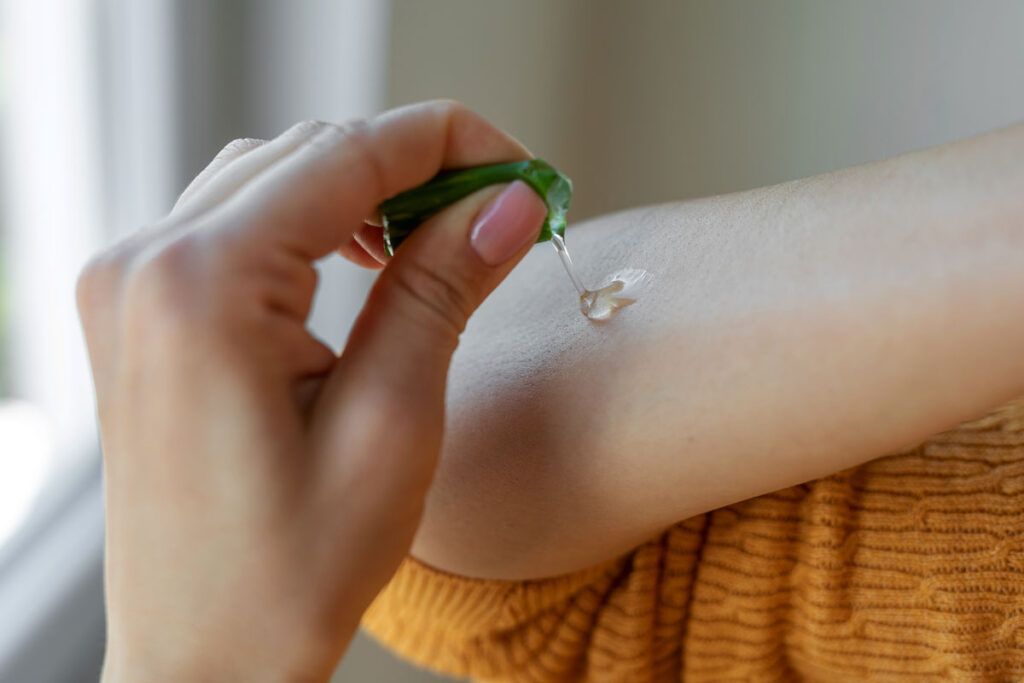People who have received a psoriasis diagnosis may benefit from natural remedies in some cases. These natural treatment solutions take various forms, most of which can be found in food ingredients.
With the proper use of these natural remedies, some individuals may notice relief in certain psoriasis symptoms, such as discoloration, plaques, and itching.
Aloe vera

The gel from the aloe vera plant has anti-inflammatory properties. This may make it helpful in managing psoriasis because the condition is strongly linked with inflammation, according to 2021 research.
Applying skin ointments containing aloe vera can possibly reduce the inflammatory rash associated with psoriasis. The National Psoriasis Foundation (NPF) recommends using a cream or gel that has at least 0.5% aloe vera.
You may choose to apply the cream three times per day. Medical experts recommend applying the cream on the skin’s surface and not internally.
It is possible to be allergic to aloe vera. That’s why it’s important to apply a test patch on the inside of your arm. If you have no reaction within 12–24 hours, it should be safe to use.
Oat baths
A warm bath with oatmeal can have a soothing and moisturizing effect on the skin. As a result, oatmeal baths can potentially reduce the dryness and irritation linked with psoriasis.
According to a 2016 research review on psoriasis, some studies suggest that an oatmeal bath can reduce psoriasis itching and discoloration. After an oatmeal bath, applying oil on the skin helps keep the skin moisturized.
A 2020 study found that oatmeal was effective in reducing inflammation, repairing the skin barrier, and improving the microbiome of healthy skin. This study was researching oatmean’s effect on eczema, but these benefits are also helpful in people with psoriasis.
Essential oils
Essential oils such as tea tree oil have been shown to have anti-inflammatory and antimicrobial properties, which makes them potentially effective for psoriasis.
A 2016 study on a natural preparation of several herbal remedies, including tea tree oil, saw beneficial results in people with psoriasis due to antioxidant and anti-inflammatory effects.
Yet there is no conclusive scientific evidence to prove that tea tree oil is effective for psoriasis. Medical experts recommend using tea tree oil with caution because of the risk of allergic reactions in some people.
Essential oils must be diluted in a carrier oil before application to the skin, usually at a ratio of 1–2 drops of essential oil to 1 tablespoon of carrier oil. Essential oils should not be ingested.
You should also test for allergy by doing a patch test on your inner arm. If you have no reaction within 12–24 hours, it should be safe to use. You should discontinue use if a rash develops or your skin worsens.
While research suggests there are health benefits, the FDA doesn’t monitor or regulate the purity or quality of essential oils. It’s important to talk with a healthcare professional before you begin using essential oils and be sure to research the quality of a brand’s products. Always do a patch test before trying a new essential oil.
Capsaicin
Capsaicin is the active ingredient in chili peppers, with anti-inflammatory effects. Capsaicin can inhibit nerve endings responsible for pain transmission.
A 2020 study revealed the potential that capsaicin may reduce inflammatory changes and scaling seen in psoriasis. But more research evidence is required to confirm its use in managing psoriasis.
And because capsaicin-containing creams may cause burning sensations in some people, you should apply these creams with caution.
Turmeric
Tumeric is a spice with an active ingredient called curcumin, which has anti-inflammatory and antioxidant properties. Turmeric can alter the inflammatory chemicals that cause psoriasis.
A 2018 study demonstrated that curcumin could help individuals with psoriasis. Curcumin is available in supplement pills or in food ingredients such as curry. But you should always consult with a doctor for professional guidance before taking these or any supplements.
Apple cider vinegar
Apple cider vinegar has relaxing effects, which makes it invaluable for relieving burning sensations in psoriasis. Research from 2021 has discussed apple cider vinegar’s antibacterial and antioxidant properties as well.
Applying apple cider vinegar on the skin requires caution, though. The NPF recommends using organic apple cider vinegar and a 1:1, or equal, dilution before use.
The following precautions are essential when using apple cider vinegar:
- Avoid using it on open wounds on the skin.
- Rinse the skin once it dries off to prevent irritation.
You may choose to apply it multiple times per week. Discontinue its use if you notice any distressing burning sensations.
Other treatments
Apart from natural remedies, medical therapies are available for managing psoriasis. These conventional treatments may be suitable when psoriatic skin lesions persist even if you try home remedies.
The following are some of the treatment options for psoriasis:
- Topical treatments: Strong ointments and creams can help reduce mild psoriasis symptoms. Some are available over the counter. These can include:
- corticosteroids like flurandrenolide (Cordran)
- salicylic acid
- coal tar
- anthralin
- retinoids like tretinoin (Renova) or tazarotine (Tazorac)
- Systemic medications: When topical treatments don’t work as they should, other medications can help. Oral or injectable medications can help reduce symptoms like inflammation. These include:
- cyclosporine
- oral retinoids
- methotrexate
- acitretin (Soriatane)
- Light therapy: Phototherapy, or light therapy, uses ultraviolet light to slow the growth of skin cells.
Complementary and integrative therapy, such as mindfulness and dietary changes, may be useful in some cases of psoriasis.
The treatment of psoriasis typically requires input from a primary care physician or specialists, such as dermatologists or rheumatologists, in some cases.
It is critical to consult with a doctor for professional evaluation and guidance in choosing the right medical therapy.
If you need help covering the cost of medications, the free Optum Perks Discount Card could help you save up to 80% on prescription drugs. Follow the links on drug names for savings on that medication, or search for a specific drug here.
